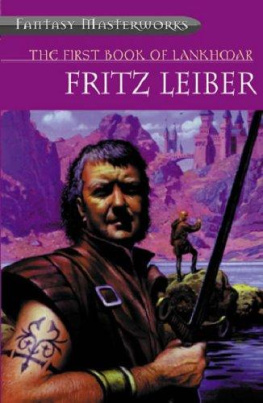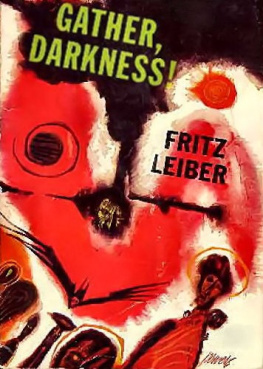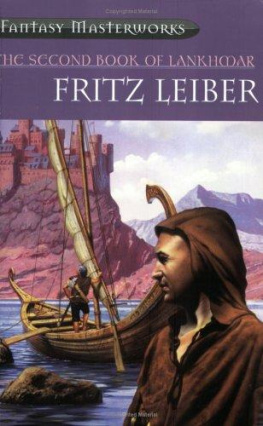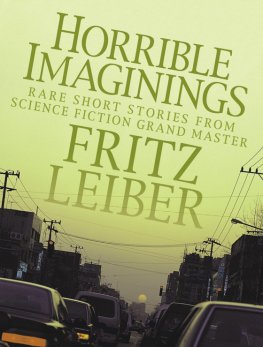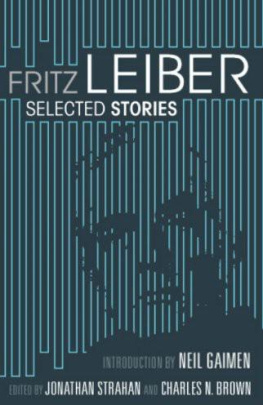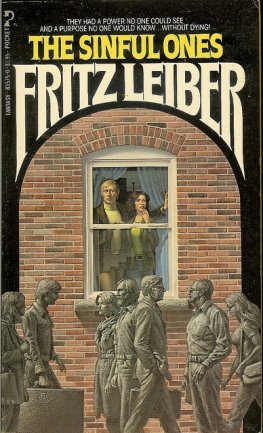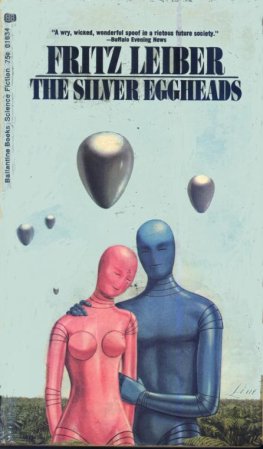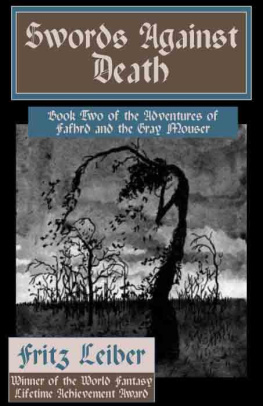Fritz Leiber - The Black Gondolier and Other Stories
Here you can read online Fritz Leiber - The Black Gondolier and Other Stories full text of the book (entire story) in english for free. Download pdf and epub, get meaning, cover and reviews about this ebook. genre: Science fiction. Description of the work, (preface) as well as reviews are available. Best literature library LitArk.com created for fans of good reading and offers a wide selection of genres:
Romance novel
Science fiction
Adventure
Detective
Science
History
Home and family
Prose
Art
Politics
Computer
Non-fiction
Religion
Business
Children
Humor
Choose a favorite category and find really read worthwhile books. Enjoy immersion in the world of imagination, feel the emotions of the characters or learn something new for yourself, make an fascinating discovery.

- Book:The Black Gondolier and Other Stories
- Author:
- Genre:
- Rating:3 / 5
- Favourites:Add to favourites
- Your mark:
- 60
- 1
- 2
- 3
- 4
- 5
The Black Gondolier and Other Stories: summary, description and annotation
We offer to read an annotation, description, summary or preface (depends on what the author of the book "The Black Gondolier and Other Stories" wrote himself). If you haven't found the necessary information about the book — write in the comments, we will try to find it.
The Black Gondolier and Other Stories — read online for free the complete book (whole text) full work
Below is the text of the book, divided by pages. System saving the place of the last page read, allows you to conveniently read the book "The Black Gondolier and Other Stories" online for free, without having to search again every time where you left off. Put a bookmark, and you can go to the page where you finished reading at any time.
Font size:
Interval:
Bookmark:
The Black Gondolier and Other Stories
Fritz Leiber
Fritz and me
If you ask any long-time aficionado of fantastic literature to name his favorite authors, the fan of science fiction will likely name Fritz Leiber somewhere in his top five. So to, will the devotee of sword and sorcery mention the wonderful tales of Fafhrd and the Gray Mouser as among the very best that the genre has to offer. There have been many excellent writers of fantasy over the years, many excellent writers of science fiction, and many fine writers of horror stories. Arguably, the very best of them all was Fritz Leiber.
Leiber was the author that showed us what sword and sorcery fiction can and should be with his Lankhmar stories that spanned nearly fifty years. In the realm of science fiction, his Change War saga has stood the test of time and remains a classic in the genre. As far as horror fiction, most readers will place Our Lady of Darkness and Conjure Wife at or near the top of any list of great novels in the field. Then of course we have the socio-political satire of A Specter is Haunting Texas and the classic X-files-like paranoia of Youre All Alone, written years before Chris Carpenter was a twinkle in his father's eye.
I'm afraid that I won't be able to fill this introduction with many personal anecdotes, I met the author on only a few occasions and our conversations often revolved around the malady of alcoholism and it's peculiar affinity for the creative sort. A subject that holds considerable fascination for those for whom it's a life or death issue, but to the average person it's a rather dull topic. I do treasure the fact that I was able to meet and chat with the man whose influence on my own reading and writing was so profound.
Like many of us who came on their first genre fiction at an early age in the sixties, I'd quickly discovered the works of Edgar Rice Burroughs and Robert E. Howard; I was quite impressed, but when I stumbled on a book entitled Swords Against Deviltry, I was transported ... This was what I'd been looking for! I quickly used my meager allowance money to snap up every book that I could find that had the magical name of Leiber on it. This included some terrific science fiction, the novel Gather, Darkness, and finally a handful of anthologies where I discovered Smoke Ghost", The Dreams of Albert Moreland", and Spider Mansion for the first time.
Over the years I managed to accumulate as close to a complete collection of Leiber's work as you're likely to find. And for years I assumed that all his work was readily attainable, if not perpetually in print.
The book that you hold in your hands is a result of a curious serendipity, that there is no author living or dead that I would be more honored to pen an introduction about than Fritz Leiber goes without saying. That I would've thought this to be an unlikely occurrence is an understatement. After all, Leiber belongs to that pantheon of great writers that have shaped and molded the field of fantastic literature in the latter half of the twentieth century and the works of such individuals are perpetually kept in-print and readily accessible by one and all. Aren't they?
Apparently the answer to that question is in the negative. When Steve Savile first approached me to verify the appearances of several Leiber stories in conjunction with a chapbook that he was preparing for the British Fantasy Society I was amazed at just how much material was no longer available to modern readers. A few e-mails later and we were busily at work preparing two volumes that would bring the lost Leiber stories back into print. Even with the space of two volumes to work with it's been impossible to include everything that we would have liked to. We've chosen to focus on those stories that most modern readers would have the most difficult time locating with a couple of familiar tales included. Some stories we considered far too significant to be excluded and you will see some of these familiar tales interspersed in these two volumes. For the most part, our focus has been to restore to print the most significant of Leiber's weird tales that have been unavailable for twenty or more years.
The first thing that became apparent to me as we assembled this collection was just how early in his career Leiber had established himself as a master of the weird tale. While he did write a few stories that could be considered standard fare for the pulps, (such as Spider Mansion with its weird-menace excesses) as an example. From the very start his stories took on a modern attitude quite unlike that of his contemporaries in Weird Tales , who were busily scrambling to pen stories of improbably-named cosmic monstrosities and babbling aliens in a misguided homage to H.P. Lovecraft...
While Leiber's earliest stories can be classified as updates of the tropes of earlier horror fiction, there is a decided modernity about them. A primary concern is that of the science fiction writer concerned about technologies gone horribly awry. In the early story Spider Mansion", for all its classic gothic trappings it is at its core a tale of medical experiments gone wrong. The same can be said of the much later (1950) tale The Dead Man In both cases, it's not the science that is at fault for the dire consequences, but rather the fallible human element that manages to muck things up badly.
Both of these stories foreshadow Leiber's later work where he fuses the concerns of the twentieth century with the mold of the classic weird tale of decades past. In The Girl with the Hungry Eyes he considers the vampirism of advertising as a quite literal reality. In The Black Gondolier", The Man Who Made Friends with Electricity", and Mr. Bauer and the Atoms present our modern forms of energy in a new and terrifying light. Leiber's mad scientists are not mad in the sense of the old villains from the old Universal films from the 1930's, but rather they are often as not blinded by an arrogance and absolute certainty in their own wisdom that they fall afoul of their own inventions and concepts. In fact it could be said of Leiber that among his contemporaries only Philip K. Dick was his equal at writing science fiction that was truly horrifying.
The theme of humanity as but a bit player in the cosmic drama was an idea that Leiber often made use of in ways far more inventive than that of many of his contemporaries. Whereas H.P. Lovecraft took this idea in one direction, Leiber made the concept of an unknowable and hostile cosmos far more personal in stories such as The Dreams of Albert Moreland". In this story a chess master is drawn into a game with frighteningly high stakes against an opponent reminiscent of one of Lovecraft's Great Old Ones. (Cthulhu as a galactic gamesmaster)? Not exactly, though in the hands of a lesser writer the story could easily have become that ludicrous. In Leiber's hands it's more about the all-consuming nature of the obsessive and the danger of actually getting what we want. Albert Moreland wants a suitable opponent to test his skill on and he gets exactly that.
Leiber's correspondence with Lovecraft is interesting in that of all of Lovecraft's correspondents only Leiber seemed immune to the desire to begin banging out slavish pastiches of the mythos created by the elder writer. In fact, it may well be that Leiber's correspondence led him to an early realization that the horrors of the past were just that, the past and would need a new and vital approach in the latter half of the century. It was not until considerably after Lovecraft's death that Leiber penned an actual mythos story. In this area as in other sub-genres, he excelled and his The Terror from the Depths is perhaps the standout piece in Edward Berglund's watershed anthology Disciples of Cthulhu
Font size:
Interval:
Bookmark:
Similar books «The Black Gondolier and Other Stories»
Look at similar books to The Black Gondolier and Other Stories. We have selected literature similar in name and meaning in the hope of providing readers with more options to find new, interesting, not yet read works.
Discussion, reviews of the book The Black Gondolier and Other Stories and just readers' own opinions. Leave your comments, write what you think about the work, its meaning or the main characters. Specify what exactly you liked and what you didn't like, and why you think so.

